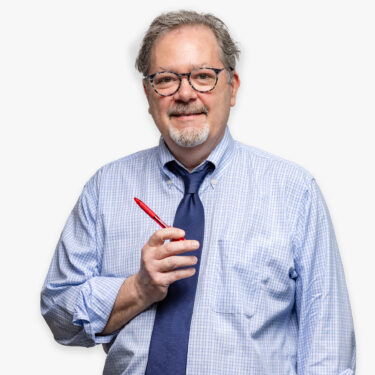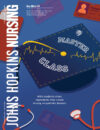DNP psych student Jenna Hernandez can’t fix everything. That won’t stop her from trying.
Jenna Hernandez hopes to become “that person.” A student in the Doctor of Nursing Practice (Psychiatric Mental Health NP) program, she finds herself regularly assigned to problem-solving teams at Cedars-Sinai Medical Center in Los Angeles. Success and a sense of fulfillment there bred a desire for more.
“They’re pointing at you,” she says from LA, where Hernandez lives and works toward such leadership status. “They’re looking to you for the answers.”
To hear her bosses, she’s getting closer. “My manager is like, ‘Hey, Jenna, I want you to do this quality improvement [QI] project with me.’ I’m like, ‘Me?’ ”
Any such hesitancy is easing as her own confidence and knowledge build. “They kind of go hand in hand. I’ll learn stuff in school, and then I’m better equipped to apply it to my job, where it just makes me a better nurse.”
“Being in the DNP program makes me question everything a little bit more now in terms of, ‘Is this what we should be doing?’ Right now, I’m doing two QI projects and I kind of signed myself up for a third just by being interested in the subject,” she says. “So I’m on a lot, but it’s because I know I can use what I’ve learned in school to help.”
Hernandez grew up in Moorpark, a Ventura County suburb outside LA. Aside from a four-year undergrad stint at the University of Michigan, she’s called California home. Family’s there, and word has it that the beaches and the weather are kind of nice. “Right?”
And even in its less sunny spaces, California offers beautiful opportunities for a person, and a nurse, hoping to make a difference at every human level.
Her unit, Advanced Heart Failure Progressive Care, is populated with patients who have been through a lot. Some have had a heart transplant; others await one. Some are ineligible for transplant, perhaps because cold, hard evidence suggests an available heart might make a bigger difference inside a patient in less tenuous circumstances. That does not mean the care itself must be anything but warm and compassionate.
So the challenge is psychological as well, and this is where Hernandez the DNP-to-be is honing what could one day be a superpower.
“There was this one patient,” she recalls of a man just shy of homelessness who had been ruled ineligible for a new heart and also suffered from serious obsessive-compulsive disorder. “His life situation was not stable. He didn’t have running water or hot water or anything like that. But, he had his cat in this warehouse. … Ultimately you can’t change somebody’s life circumstances. I just spent time talking with him.” His OCD meant that “every time I gave him a pillow or a blanket, I’d have to count it, like, ‘one pillow, two pillows, three pillows,’ and if you didn’t, he would get so upset. Because I’m in this field [psychology], I maybe understood a little more. OK, whatever I can do to help minimize his anxiety. I can count a pillow.”
Maybe he couldn’t be saved, but he could for darned sure feel seen.
Hernandez won’t knock caregivers on a busy medical unit who find it difficult to make such overtures or feel awkward or unqualified to have frank, open conversations with those in their care. Rather, she hopes to empower colleagues. She’s titled her DNP project “Boosting Nursing Confidence in Discussing Depression and Anxiety with Heart Failure Inpatients.”
“You can’t fix everything. But you can help and make a big difference.”
“It’s just giving nurses the confidence to talk about that,” Hernandez explains. The intervention she’s working on would include education through role-playing activities as well as a set of talking points to put caregivers and patients at ease more quickly.
In addition to school and work, she volunteers with Safe Place for Youth, a center for unhoused young people in nearby Venice. Hernandez’s own safety net—a respiratory therapist mom and police officer dad—is still just an hour away in Moorpark. She understands the power of stability, of having someone to talk to, to hang out with, to be able to rely on. As her own experience in psychology grows, “I have more of the tool set to be more mindful about how I am interacting and what these young people need from me and how I can be a resource to them.”
Still more than a year from completing her DNP, Hernandez credits the program with leveling up her natural abilities to lead by example and adjust to real-life medical and life situations that are rarely ideal. (Not yet, anyway. If it needs fixing, Hernandez is probably on it.) “There’s a bunch of curveballs that have come my way in this process and I’m figuring them out now. But the DNP gives you the confidence to be able to manage it” … and be ready the next time a supervisor taps you on the shoulder.
“When I was new, I would always look up at people doing QI projects. ‘Oh, my gosh, they are so much older. They’re so smart. I’ll never be able to do that.’ Imposter syndrome. And now, shoot, I’m the one people are asking, ‘Oh, how do you do this?’ ”
As for her own mental health, Hernandez has learned a lot there too. “As my time as a nurse has gone on, it’s become a lot easier to leave work at work and enter a new mindset when you get home. I remember my first year of nursing, I worked three days a week and came home at least two days a week crying.”
A charge nurse she confided in back then helped put it all in perspective. “What she told herself is, it’s OK. You can feel those emotions when you feel them, but it will start to get easier. You will start to see that you are doing your best. You can’t fix everything. But you can help and make a big difference.”
Hernandez has kept her personal dial set right there.
“It’s that mindset of, ‘I did my best. There’s nothing more I could have done.’ And if you do think that there is something more you could have done, write it down, journal, but don’t sit there with that on your head. Have a routine that you feel safe and comfortable in,” Hernandez explains, adding that a gym workout, keeping up with friends and family, and an occasional early morning solo by the Pacific Ocean never hurt. “Remember, to take care of other people, you do need to take care of yourself.” ◼


